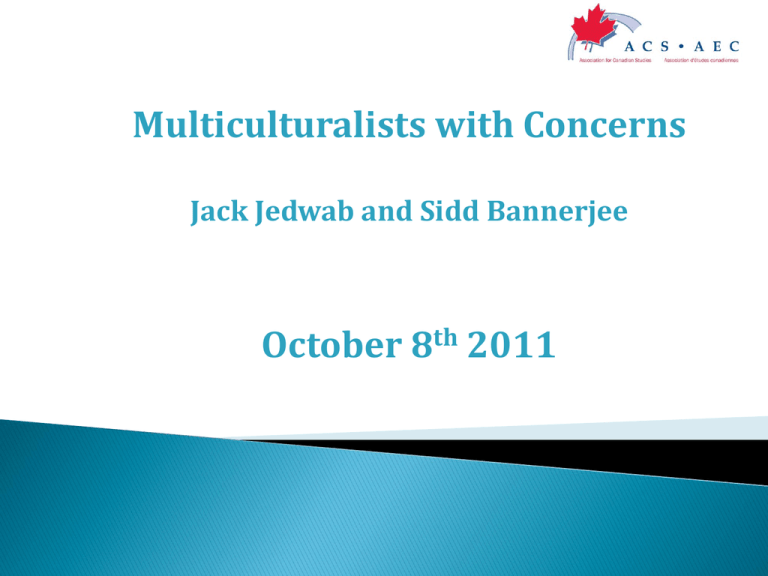
Multiculturalists with Concerns
Jack Jedwab and Sidd Bannerjee
October 8th 2011
This poll was conducted online in all regions of Canada with a representative sample of 2,345
Canadians, between September 20th and October 3th, 2011.
Final data was weighted by age, gender, language, level of education, regions and household
composition (with or without children under the age of 18) in order to obtain a representative
sample of the Canada population.
A probabilistic sample of 2,345 respondents would yield a margin of error of 2%, 19 times
out of 20.
Survey respondents were selected randomly from the LegerWeb Internet panel, which has
over 350,000 Canadian households. A stratification process was applied to invitation lists to
ensure optimal representation of respondents. The panelists were recruited randomly from
Leger Marketing telephone surveys. Several quality control measures ensure the
representativeness and accuracy of Leger Marketing’s surveys with its panel members.
In the tables, the numbers in bold red indicate a significantly higher proportion than that of
other groups. Numbers in bold blue indicate a significantly lower proportion than that of
other groups.
This report presents the findings of a survey conducted among a sample of 1,000 adults comprising 490 men and 510
women 18 years of age and older.
The online omnibus study is conducted once a week among an Internet representative U.K. sample of 1,000 adults 18
years of age and older. Interviewing for this survey was completed on September 16-21, 2011.
Completed interviews are weighted by five variables: age, sex, geographic region, race and education to ensure reliable
and accurate representation of the total U.S. population, 18 years of age and older. The raw data are weighted by a
custom designed program which automatically develops a weighting factor for each respondent. Each respondent is
assigned a single weight derived from the relationship between the actual proportion of the population based on US
Census data with its specific combination of age, sex, geographic characteristics, race and education and the
proportion in the sample. Tabular results show both weighted and unweighted bases.
Respondents for this survey were selected from among those who have volunteered to participate in online surveys
and polls. The data have been weighted to reflect the demographic composition of the 18+ population. Because the
sample is based on those who initially self-selected for participation, no estimates of sampling error can be calculated.
All sample surveys and polls may be subject to multiple sources of error, including, but not limited to sampling error,
coverage error, error associated with nonresponse, error associated with question wording and response options, and
post-survey weighting and adjustments.
As required by the Code of Standards of the Council of American Survey Research Organizations, we will maintain the
anonymity of our respondents. No information will be released that in any way will reveal the identity of a respondent.
Our authorization is required for any publication of the research findings or their implications.
ORC International has exercised its best efforts in the preparation of this information. In any event, ORC assumes no
responsibility for any use which is made of this information or any decisions based upon it.
This report presents the findings of a survey conducted among a sample of 1,019 adults comprising 503 men and 516
women 18 years of age and older.
The online omnibus study is conducted twice a week among a demographically representative U.S. sample of 1,000
adults 18 years of age and older. Interviewing for this survey was completed on September 15-18, 2011.
This report presents the findings of a survey conducted among a sample of 1,001 adults comprising 487 men and 514
women 18 years of age and older.
The online omnibus study is conducted once a week among an Internet representative French sample of 1,000 adults
18 years of age and older. Interviewing for this survey was completed on September 16-21, 2011.
CANADA
“It was the view of the royal commission, shared by
the government and, I am sure, by all Canadians,
that there cannot be one cultural policy for
Canadians of British and French origin, another for
the original peoples and yet a third for all others.
For although there are two official languages, there
is no official culture, nor does any ethnic group take
precedence over any other. No citizen or group of
citizens is other than Canadian, and all should be
treated fairly.”
“A policy of multiculturalism within a bilingual framework
commends itself to the government as the most suitable means of
assuring the cultural freedom of Canadians. Such a policy should
help break down discriminatory attitudes and cultural jealousies.
National unity if it is to mean anything in the deeply personal
sense, must be founded on confidence in one's own individual
identity; out of this can grow respect for that of others and a
willingness to share ideas, attitudes and assumptions. A vigorous
policy of multiculturalism will help create this initial confidence. It
can form the base of a society which is based on fair play for all.”
“The government will support and encourage the various cultures
and ethnic groups that give structure and vitality to our society.
They will be encouraged to share their cultural expression and
values with other Canadians and so contribute to a richer life for us
all.”
About half of Quebec Francophones say that their working or school environment is
ethnically diverse, as opposed to respondents in BC and Alberta where over
2 in 3 make that claim
No:113
B1
Age
18Total 24
2534
3544
Language
4554
5564
Province
65+ French English Other Maritimes QC ON MB/SK AB BC
Q4AA
My workplace/school is ethnically diverse
Total pondéré :
2345
276
380
457
472
349 411
511
1350
468
171 558 906
157 245 307
Total absolu :
2345
486
324
313
400
436 386
562
1566
212
157 584 722
228 211 443
TOTAL AGREE
61% 74% 66% 68% 56% 64% 40%
46%
62% 72%
57% 52% 62%
56% 69% 69%
TOTAL
DISAGREE
21% 17% 25% 21% 29% 15% 17%
36%
19% 12%
23% 33% 18%
23% 13% 15%
I don't know
14%
5%
6%
8% 11% 17% 33%
13%
15%
13%
16% 11% 15%
17% 13% 13%
I prefer not to
answer
5%
5%
3%
3%
5%
5%
4%
3%
4% 10%
5%
5%
5%
4%
4%
4%
While 3 in 5 respondents disagree that ethnic diversity weakens the national
culture, a sizeable minority (36%) agree with this statement.
62% of Anglophones and over 2 in 3 respondents in the Maritimes are of the
opinion that having many ethnic groups does not weaken the national culture.
No:101
B1
Age
18Total 24
2534
3544
Language
4554
Province
5564 65+ French English Other Maritimes QC ON MB/SK AB BC
Q4U
Having many ethnic groups weakens the national culture
Total pondéré :
2345
276
380
457
472
349 411
511
1350
468
171 558 906
157 245 307
Total absolu :
2345
486
324
313
400
436 386
562
1566
212
157 584 722
228 211 443
TOTAL AGREE
36% 36% 39% 34% 36% 33% 37%
45%
33%
33%
28% 43% 36%
32% 32% 33%
TOTAL DISAGREE 59% 57% 57% 61% 56% 64% 60%
4% 4% 3% 3% 7% 3% 2%
I don't know
50%
4%
62%
3%
61%
67% 52% 59%
3% 4% 5%
64% 63% 63%
1%
1%
1%
I prefer not to
answer
1%
3%
1%
2%
1%
0% 1%
5%
3%
2% 0%
2% 4% 3%
3% 1% 1%
On a follow-up question regarding ethnic diversity, we asked respondents if they felt that immigrants
should give up their customs and traditions and integrate into the majority culture.
Some 45% believed that immigrants should integrate into the majority culture versus 49% who felt that
immigrants were fine maintaining their native customs and traditions. It was Quebecers who were most
likely (54%) to agree with the statement and Atlantic Canadians disagree (60%).
No:103
B1
Age
18Total 24
2534
3544
Language
4554
5564
Province
65+ French English Other Maritimes QC ON MB/SK AB BC
Q4V
Immigrants should give up their customs and traditions and become more like the majority
Total pondéré :
2345
276
380
457
472
349 411
511
1350
468
171 558 906
157 245 307
Total absolu :
2345
486
324
313
400
436 386
562
1566
212
157 584 722
228 211 443
TOTAL AGREE
45% 40% 45% 42% 46% 47% 52%
54%
43%
44%
34% 54% 44%
49% 43% 41%
TOTAL
DISAGREE
49% 53% 48% 52% 48% 51% 46%
41%
53%
49%
60% 40% 51%
48% 52% 53%
I don't know
4%
4%
5%
4%
6%
2%
2%
4%
3%
6%
4%
4% 4%
1% 4% 4%
I prefer not to
answer
1%
3%
1%
2%
1%
0%
0%
2%
1%
1%
2% 2% 0%
2% 0% 2%
Related to the previous question, a narrow majority of responders are in favour of trying
harder to accept the customs and
traditions of immigrants. The widest gaps are in responses in Quebec and the Atlantic Provinces –
with the former least likely to agree that the majority should try harder
No:105
B1
Age
Total
1824
2534
3544
Language
4554
Province
5564 65+ French English Other Maritimes QC ON MB/SK AB BC
Q4W
The majority should try harder to accept the customs and traditions of cultural and religious groups
Total pondéré :
2345
276
380
457
472
349 411
511
1350
468
171 558 906
157 245 307
Total absolu :
2345
486
324
313
400
436 386
562
1566
212
157 584 722
228 211 443
TOTAL AGREE
51% 58% 52% 47% 45% 52% 56%
38%
53% 60%
62% 40% 54%
54% 49% 55%
TOTAL
DISAGREE
43% 32% 41% 46% 47% 44% 40%
55%
42% 31%
29% 53% 40%
41% 47% 37%
I don't know
5%
6%
6%
4%
7%
4% 4%
5%
4%
8%
7%
5% 5%
2% 3% 7%
I prefer not to
answer
1%
3%
1%
3%
1%
0% 0%
2%
1%
2%
2% 3% 1%
3% 1% 1%
When asked if having a linguistically, religiously
and ethnically homogenous country would be preferable to a diverse country some
2 in 3 Canadians expressed a preference for a diverse population, while 3 in 10 (30%) wer
less supportive. Perhaps surprisingly, the highest number of respondents in favour of a
uniform Canadian milieu were allophones
No:87
B1
Age
Total
1824
2534
3544
Language
4554
5564
Province
65+ French English Other Maritimes QC ON MB/SK AB BC
Q4N
A country in which everyone speaks the same language and has similar ethnic backgrounds and
religious beliefs is preferable to a country in which people speak different languages and have different
ethnic backgrounds and religious beliefs
Total pondéré
:
2345
276 380 457 472
349
411
511
1350
468
171 558 906
157 245 307
Total absolu :
2345
486 324 313 400
436
386
562
1566
212
157 584 722
228 211 443
TOTAL
AGREE
30% 35% 33% 30% 30% 27% 27%
29%
28%
37%
26% 29% 33%
26% 30% 28%
TOTAL
DISAGREE
63% 54% 59% 62% 60% 70% 70%
62%
66%
56%
68% 61% 62%
67% 62% 64%
I don't know
6%
7%
7%
5%
8%
3%
3%
6%
5%
6%
5%
7%
5%
5%
7%
6%
I prefer not to
answer
1%
3%
1%
2%
2%
0%
0%
2%
1%
1%
1% 3% 0%
2%
1%
2%
Ultimately, a substantial majority of Canadians (over 2 in 3 or 69%) believe that their
society is strengthened by having many cultural and religious groups.
The highest levels of support for having different cultural and
religious groups is in the Maritimes (almost 4 in 5 or 79%) and lowest in Quebec
(57%).
No:99
B1
Age
18Total 24
2534
3544
Language
4554
Province
5564 65+ French English Other Maritimes QC ON MB/SK AB BC
Q4T
Society is strengthened by having many cultural and religious groups
Total pondéré :
2345
276
380
457
472
349 411
511
1350
468
171 558 906
157 245 307
Total absolu :
2345
486
324
313
400
436 386
562
1566
212
157 584 722
228 211 443
TOTAL AGREE
69% 71% 69% 63% 66% 77% 70%
56%
71%
75%
79% 57% 71%
74% 71% 73%
TOTAL
DISAGREE
25% 21% 25% 31% 27% 20% 26%
36%
24% 19%
14% 35% 24%
20% 26% 22%
I don't know
5%
5%
5%
4%
7%
3% 3%
6%
4%
5%
6%
6% 5%
3% 2% 4%
I prefer not to
answer
1%
3%
1%
2%
1%
0% 1%
1%
1%
1%
2%
2% 0%
3% 1% 1%
Although they may be divided around certain dimensions of multiculturalism, Canadians
widely agree that young people should preserve their cultural traditions.
Over 4 in 5 (81%) agreed that they should, and this was the case across all linguistic
groups and in the regions.
No:111
B1
Age
18Total 24
2534
3544
Language
4554
Province
5564 65+ French English Other Maritimes QC ON MB/SK AB BC
Q4Z
Young people should preserve their cultural traditions
Total pondéré :
2345
276
380
457
472
349 411
511
1350
468
171 558 906
157 245 307
Total absolu :
2345
486
324
313
400
436 386
562
1566
212
157 584 722
228 211 443
TOTAL AGREE
81% 79% 83% 83% 76% 84% 81%
79%
80%
85%
83% 80% 80%
82% 79% 84%
TOTAL
DISAGREE
13% 10% 11%
14%
14%
9%
8% 13% 14%
10% 14% 12%
9% 16% 14% 16%
I don't know
5%
7%
6%
6%
7%
3% 3%
6%
5%
5%
8% 5% 5%
5% 6% 3%
I prefer not to
answer
1%
4%
1%
2%
1%
0% 1%
2%
1%
1%
1% 2% 1%
3% 1% 1%
Over and above the perceptions respondents have of diversity, we asked if they
preferred to live in a neighbourhood as ethnic and cultural minorities or if they
preferred living in a neighbourhood where most people share their cultural background
The results reveal that a greater percentage (49% vs. 44%) would be more
comfortable living in a neighbourhood that is more culturally uniform as opposed to dive
This is especially the case in Quebec (61%) as opposed to BC (40%).
No:107
B1
Age
18Total 24
2534
3544
Language
4554
5564
Province
65+ French English Other Maritimes QC ON MB/SK AB BC
Q4X
I prefer living in a neighbourhood where most people share my cultural background
Total pondéré :
2345
276
380
457
472
349 411
511
1350
468
171 558 906
157 245 307
Total absolu :
2345
486
324
313
400
436 386
562
1566
212
157 584 722
228 211 443
TOTAL AGREE
49% 52% 53% 48% 49% 48% 45%
61%
45%
46%
46% 61% 48%
43% 43% 40%
TOTAL
DISAGREE
44% 39% 38% 45% 42% 49% 51%
32%
48%
46%
47% 32% 46%
47% 49% 53%
I don't know
6%
7%
8%
5%
8%
3%
3%
6%
5%
6%
6%
5% 6%
7% 7%
6%
I prefer not to
answer
1%
3%
1%
1%
1%
0%
0%
1%
1%
1%
1%
1% 1%
2% 1%
1%
Finally, we asked respondents about their actual friendships, with
2 in 3 agreeing that most of their friends were of the same ethnic or cultural background.
That number goes up to nearly 4 in 5 (79%) in Quebec and is lowest amongst allophones
No:109
B1
Age
18Total 24
2534
3544
Language
4554
Province
5564 65+ French English Other Maritimes QC ON MB/SK AB BC
Q4Y
Most of my friends share the same ethnic or cultural background
Total pondéré :
2345
276
380
457
472
349 411
511
1350
468
171 558 906
157 245 307
Total absolu :
2345
486
324
313
400
436 386
562
1566
212
157 584 722
228 211 443
TOTAL AGREE
66% 66% 68% 65% 64% 67% 69%
79%
66% 55%
71% 76% 63%
67% 59% 63%
TOTAL
DISAGREE
30% 27% 31% 31% 31% 31% 27%
18%
31% 39%
25% 21% 34%
28% 38% 33%
I don't know
3%
4%
0%
3%
4%
2% 3%
1%
2%
4%
3%
2%
3%
2%
3% 3%
I prefer not to
answer
1%
3%
1%
1%
1%
0% 1%
1%
1%
2%
2%
1%
1%
2%
0% 1%
INTERNATIONAL
COMPARISONS
Multiculturally Ambiguous
The Western immigrant receiving world is in a state of
multicultural ambiguity.
Americans more than Canadians seem less favourable
to assimilation and even the idea of living amongst
their own may merely mean that they believe in
cultural protection and not the rejection of others.
Still, there remains confusion about what
multiculturalism means as there continues to be a
widely held view that young people should preserve
their cultural traditions.
On the 40th anniversary of the Multiculturalism Act,
the jury is out on multiculturalism and its future is
difficult to predict as the population is divided and
unclear about how things it holds dear (the right to
preserve its heritage) cannot be extended to all
others.
Canadians are the most diverse in terms of
the Workplace and/or in schools
My workplace/school is United
ethnically diverse
States
Canada
France
UK
Strongly Agree
27%
31%
17%
19%
Somewhat Agree
43%
42%
50%
48%
Somewhat Disagree
21%
18%
25%
25%
Strongly Disagree
9%
9%
8%
9%
All countries at about the same level of
comfort when dealing with those from
a different culture.
United
I am confident when I States
interact with people in a
culture that is unfamiliar
to me
Canada
UK
Strongly Agree
20%
18%
17%
Somewhat Agree
51%
56%
56%
Somewhat Disagree
26%
22%
24%
Strongly Disagree
3%
4%
3%
Canadian least likely to see homogeneity and cohesion as preferable national model
(only 1 in 3); British most likely (more than 1 in 2 (54%).
A country in which everyone United States Canada
speaks the same language and
has
similar
ethnic
backgrounds and religious
beliefs is preferable to a
country in which
people
speak
different
languages and have different
ethnic
backgrounds
and
religious beliefs
UK
Strongly Agree
Somewhat Agree
Somewhat Disagree
11%
30%
27%
11%
19%
33%
17%
37%
36%
Strongly Disagree
22%
30%
10%
Canadians least averse to living in neighbourhood that is ethnically diverse (50%);
British generally prefer living in a homogenous neighbourhood (67%).
United States
Canada
UK
Strongly Agree
14%
14%
19%
Somewhat Agree
45%
36%
48%
Somewhat Disagree
32%
31%
27%
Strongly Disagree
8%
13%
5%
E. I prefer living in a
neighborhood where
most people share my
cultural background
Americans most likely (90%) to want their youth to maintain their cultural traditions
Young people should United States
preserve
their
cultural traditions
Canada
UK
Strongly Agree
34%
24%
19%
Somewhat Agree
56%
57%
65%
Somewhat Disagree
9%
11%
14%
Strongly Disagree
2%
2%
2%
4 in 5 Americans likely to agree that their society is strengthened
by having multiple cultural and religious groups.
United States
Canada
UK
Strongly Agree
Somewhat Agree
34%
47%
27%
42%
16%
43%
Somewhat Disagree
14%
17%
32%
Strongly Disagree
5%
8%
9%
A.
Society
is
strengthened
by
having many cultural
and religious groups
British most likely (77%) to have friends from the same ethnic or cultural background
as themselves; North Americans (65%) less likely.
United States
Canada
UK
Strongly Agree
21%
24%
27%
Somewhat Agree
43%
42%
50%
Somewhat Disagree
26%
22%
19%
Strongly Disagree
10%
8%
4%
F. Most of my friends
share the same ethnic
or
cultural
background
1 in 4 Americans (27%), 1 in 3 Canadians (36%) and over half (52%) of British
believe that having many ethnic groups weakens their national culture.
United States
Canada
UK
Strongly Agree
7%
12%
16%
Somewhat Agree
20%
24%
36%
Somewhat Disagree
40%
31%
35%
Strongly Disagree
33%
29%
13%
B.
Having
many
ethnic groups weakens
the national culture
Americans least likely (29%), followed by Canadians (46%) and British (49%) to
feel that immigrants should give up their customs and traditions and become more like
the majority culture.
United States
Canada
UK
Strongly Agree
8%
17%
15%
Somewhat Agree
21%
29%
34%
Somewhat Disagree
44%
32%
40%
Strongly Disagree
28%
17%
11%
C. Immigrants should give
up their customs and
traditions and become more
like the majority
Canadians least likely (51%) to believe that the majority should try harder to accept
the customs and traditions of the cultural and religious groups;
followed by British (62%) and Americans (66%).
United States
Canada
UK
Strongly Agree
Somewhat Agree
22%
45%
15%
36%
13%
49%
Somewhat Disagree
25%
28%
30%
Strongly Disagree
9%
15%
8%
D. The majority should
try harder to accept the
customs and traditions of
cultural and religious
groups









